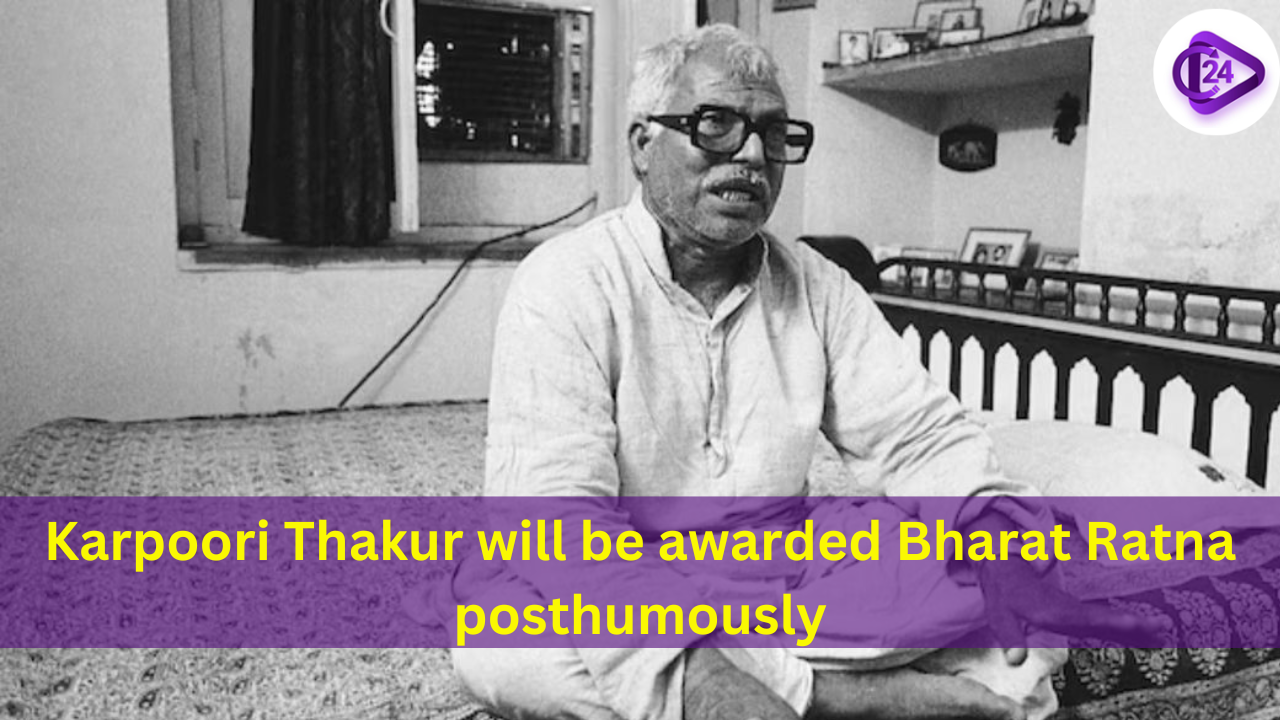Karpoori Thakur will be awarded Bharat Ratna posthumously

Recently, the government of India has named the former Chief Minister of Bihar, Karpoori Thakur as an awardee of India's highest civilian award, Bharat Ratna for 2024. He will be awarded with the Bharat Ratna posthumously on January 26, 2024. On the 100th birth anniversary of Karpoori Thakur, the government decided to honor him with the prestigious award. He is fondly known as 'Jannayak' or the leader of the people. In this article, we will learn everything about former Bihar's CM Karpoori Thakur and his struggle, vision, policies, and many more.
Who is Karpoori Thakur?
-
Karpoori Thakur was born on 24th January 1924 in Pitaunjhia, Bihar, and Orissa Province, British India.
-
He was known for his deep connection with the backward classes.
-
He joined the Quit India Movement (1942) and was jailed with other freedom fighters but kept struggling to push the Britishers out of the country.
-
He served as Chief Minister of Bihar twice, first from December 1970 to June 1971 and later from December 1977 to April 1979.
-
He also served as the second Deputy Chief Minister of Bihar from 5 March 1967 to 31 January 1968.
-
Before this, he also served as the Education minister of Bihar.
-
He also emerged as the leading backward caste leader in Bihar,
Karpoori Thakur: Landmark Decisions
-
He removed English as a compulsory subject for matriculation examinations to to make education more approachable.
-
Introduced preferential treatment for unemployed engineers in government contracts.
-
He also imposed a ban on alcohol consumption to address societal issues
-
In June 1970, he implemented the ‘Karpoori Thakur Formula’, providing 26% reservation, including 12% for OBCs, 8% for economically backward OBCs, 3% for women, and 3% for economically disadvantaged individuals from upper castes.
Karpoori Thakur: Awards
-
Recently, the government of India conferred India's Highest Citizen Award, Bharat Ratna, to Karpoori Thakur on January 26, 2024, posthumously.
-
With this, he will be the 49th personality and 4th from Bihar, who will receive this prestigious award.
-
He is also the 17th recipient to receive the award posthumously.
How many Bharat Ratna recipients are from Bihar?
-
Dr Rajendra Prasad was the first Bharat Ratna recipient from Bihar. He was awarded in 1962.
-
Later, Jayaprakash Narayan was awarded with the Bharat Ratna in 1999.
-
In 2001, Bismillah Khan was awarded with the India's highest civilian award, Bharat Ratna.
-
Now, in 2024, former CM of Bihar, Karpoori Thakur will be awarded the Bharat Ratna on 26th January 2024.
India's Highest Citizen Honour: Bharat Ratna
-
Instituted: 1954
-
First recipient (1954): Chakravarti Rajagopalachari, Dr. Sarvapalli Radhakrishnan, and Dr. ChandrasekharaVenkata Raman
-
Latest recipient (2024): Karpoori Thakur (49th)
-
Bharat Ratna is the highest civilian award in India.
-
Recognition: The award honor to recognize exceptional service/performance of the highest order in any field of human endeavor.
-
The Prime Minister of India sends the recommendation for the Bharat Ratna to the President of India.
-
The number of Bharat Ratna Awards is restricted to a maximum of three in a particular year.
-
The medal is in the form of a peepal leaf which is 5.8 cm long, 4.7 cm wide, and 3.1 mm thick
FAQs:
1. How many Bharat Ratna recipients are from Bihar?
Ans: As of 2024, there are four Bharat Ratna recipients are from Bihar i.e. Dr Rajendra Prasad (1962), Jayaprakash Narayan (1999), Bismillah Khan (2000), and Karpoori Thakur (2024).
2. Who is the 49th recipient of India’s Highest Citizen Award, Bharat Ratna?
Ans: Karpoori Thakur will be the 49th personality and 4th from Bihar, who will receive this prestigious award.
3. Who is the first recipient of India’s Highest Citizen Award, Bharat Ratna?
Ans: The First recipients of Bharat Ratna are Chakravarti Rajagopalachari, Dr. Sarvapalli Radhakrishnan, and Dr. ChandrasekharaVenkata Raman. They were awarded in 1954.




